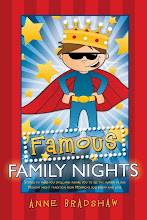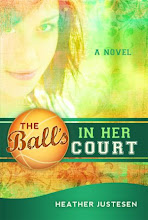I read an article by Jennie Hansen titled Where is LDS Fiction Going? It's an excellent article on how far LDS fiction has come over the last two decades. I recommend reading it.
What do you think about LDS fiction? Is is too sappy? Unrealistic? Has it improved over the years?
How does it comapre to national releases?
When you choose a book is it:
exclusively LDS fiction?
exclusively national releases?
a mixture of both?
Do you have any favorite LDS authors?
I'd love to have comments and see what you all think about LDS fiction.
Tuesday, September 21, 2010
LDS Fiction
Posted by Rebecca Talley at 3:39 PM
Labels: LDS Fiction, LDS novels, National Market Novels
Subscribe to:
Post Comments (Atom)

















8 comments:
I think many people have the perception that LDS fiction is like Christian rock & roll. They think it is a poor imitation of the real thing, and maybe it is sometimes.
The truth is, it can be very difficult to write about or discuss topics of spirituality in a way that does not feel preachy or corny. People have experienced a lot of cheese in the past and are wary to give LDS fiction a shot.
Until recently I didn't realize the LDS fiction could be fun and exciting. I thought it was all about missionaries, singles wards or unbelievable conversions. LDS fiction is good, clean writing about a wide range of topics. People need to have their eyes opened--I know I did.
Steve
What a great question! There is a very interesting line right now between fiction for lds, and lds fiction. Even Shannon Hale has managed to blur the line with The Actor and the Housewife (which I loved by the way). There are so many wonderfully clean and exciting stories out there for all ages, religions, etc., now that I feel I don't have to go to the church bookstore anymore to find them. I love it when they stock them of course, but isn't it interesting that the reverse isn't necessarily true. You don't see a lot of LDS themed novels in with the mass media (aside of Hale's). I always wondered about that. I often will peruse the Christian book section at Barnes and Noble, wondering if I'll find a church book and alas find none. Why is that? I see Austen and zombies, but no Chocolate Roses? What about Imprints? Those were wonderful reads!!!!! Everyone should have easier access to them.
I'm an avid reader but over the years have switched from national releases to almost exclusively LDS fiction. I couldn't handle the language anymore.
Yes, I have my fave LDS authors, but since I read a lot, I buy almost all fiction published :)
I think it has improved over the years, but the biggest difference is the number of authors. During the years I was reading Shirley Sealy, there weren't many authors to choose from.
I think the article took too narrow a view of the universe of "Mormon fiction." There's more to the story than what's just being published by the major LDS publishers and sold in LDS bookstores. For example, the Association for Mormon Letters has been promoting discussion and awarding high-quality fiction for several decades. Some of what receives AML awards has been from the mainstream Mormon publishers, but much has not been. Frankly, there's a lot that's been published (and continues to be published) that isn't reflected in the article.
This, of course, is one of the major problems with LDS literature. Except for the network of LDS bookstores and the publishers that serve them, there's very little way of publicizing Mormon fiction to a general Church membership. As a result, people don't know about some of the marvelous stuff that's out there.
This means (among other things) that more realistic Mormon fiction, even if it's faith-affirming, doesn't have much chance to reach the readers who might appreciate it. Publishers like Zarahemla Books (publisher of my novel, No Going Back, which is the first novel I know of to deal with homosexuality within a believing, faithful LDS context) don't get carried in the LDS bookstores, because part of their market appeal is as a "safe" alternative to mainstream bookstores. As a result, they have to think very carefully before carrying the edgier stuff.
I've written some about a possible solution to this problem (in the form of an online LDS fiction bookstore) over at A Motley Vision website (see my original post here: http://www.motleyvision.org/2010/the-concept-of-an-online-mormon-lit-bookstore/ and a follow-up on difficulties in might face here: http://www.motleyvision.org/2010/the-difficulties-faced-by-an-online-mormon-lit-bookstore/). Don't know if anything of this type will ever happen. However, I think something like this that makes the full range of Mormon fiction more generally available is necessary if we want to see real, lasting improvement in the realm of Mormon literature.
This article specifically relates to LDS fiction and I agree with Jennie that it has improved greatly over the years. We have some amazing authors that write for the LDS market in every genre. The bar has been raised for readers and for writers. I read LDS fiction simply because I've been burned too many times reading national releases--though I have read The Hunger Games, Catching Fire, Twilight.
What I'd like to see happen is LDS-standards base fiction--not LDS per se, but no profanity, no sex scenes, etc--find a solid place in the national market. I think there's a place for it, not just for LDS readers but for a whole gamut of readers who don't want to read trash. We writers can and should fill that void.
Thanks for all of the great comments!!
I very much agree with Rebecca Talley. There is a great void that needs to be filled with clean literature.
LDS fiction has come a long way. However, I think that more attention should be put into a quality product. I don't mind if the theme is LDS or not, as long as the book is interesting, well-written, and most of all, clean.
The biggest issue for me is good writing. I have read quite a few LDS novels that are in need of a whole lot of editing, are full of cliches, and are loaded with typos. That, in my opinion, makes the books come across as lacking a professional touch and I believe this hurts the market.
For those reasons, and with limited funds--especially living outside of Utah--I don't buy books by LDS authors I don't know or haven't read previously. If I'm going to set aside funds for purchasing a book, I want a novel that has had the attention given to it by the publisher that it deserves.
Favorite authors? Right now I'm quite enamored of J. Scott Savage and hope to have every book he publishes. I read a lot of Jack Weyland as a young adult, and of course, I enjoy Gerald Lund. There are others I have been waiting to read that I'm sure are just as excellent, and they're on my list to purchase as I can.
Part of the problem with getting the word out to the wider world of LDS readers about the broad and ever broadening world of LDS fiction is that most readers out in the hinterlands don't realize there are other publishers besides Deseret Book, Covenant Communications and Cedar Fort. If it isn't advertised in the Deseret Book brochure, maybe they don't want to take a chance on it. That's too bad.
Life is hard and adversity is the name of the game. Our dilemma as LDS authors is to reinforce the gospel message of repentance, forgiveness and redemption, but to do that we have to shine a light into some dark corners and write about the gritty issues members face. Maybe some of those issues are too frank and candid for publishers close to Church headquarters, but there HAS to be a publisher out there willing to risk it. I detest the word 'edgy,' but I guess that's what I'm talking about - not edginess for edginess' sake, but edginess to show how to mop up the messes.
Be that as it may, it's that frankness and candor many readers are looking for, without the vulgarity and degradation found in much of mainstream fiction. Thirty years ago I couldn't find very much LDS fiction that didn't read like it needed another rewrite, and I gave up on it, as did many of my friends who felt the same way. I've been reading a lot of LDS fiction lately, however, and find it to be excellent, and I'm sure there's more where that came from.
It's possible to deal with sensitive, sacred and personal issues without being syrupy or otherwise offensive. As a friend said recently, people who are dealing with serious issues in life may find answers as they read about fictitious characters dealing with the same issues. That isn't to say that all LDS fiction should be self-help books; as in life, not every story has a happy ending anyway. I like what author Robert Coover said about stories: "The narrative impulse is always with us; we couldn't imagine ourselves through a day without it…We need myths to get by. We need story; otherwise the tremendous randomness of experience overwhelms us. Story is what penetrates."
Ironically, we tell lies (i.e. invent people, places, societies, worlds, etc.) in order to make sense of the world but also to discuss and honor significant eternal truths.
I don't have a book published yet, but I write for people like me who had a hard time finding satisfying LDS fiction. Now that I've been rejected by the Big Three, I'm looking for Plan D and they'd better be brave. Much pondering on my blog lately has been about writing and books and the creative process. pamwrite.blogspot.com.
Pam,
I appreciated your comment. I respect those for whom "clean" fiction is an important goal for reading LDS fiction, but I agree with you that addressing important gospel topics sometimes requires a more realistic slant.
I posted an essay on this topic titled "On Writing a Realistic Novel" at my blog, at http://www.langfordwriter.com/blog/?p=37. I'd welcome thoughts and responses.
Post a Comment